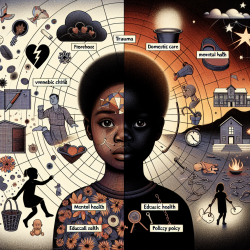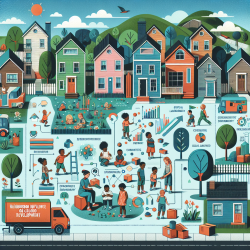Introduction
In recent years, the focus on mental health in educational settings has intensified, especially concerning vulnerable populations such as orphaned and separated children. A pivotal study, "Impact of Domestic Care Environment on Trauma and Posttraumatic Stress Disorder among Orphans in Western Kenya," sheds light on the prevalence of trauma and PTSD among these children in different care environments. This research provides valuable insights that can guide practitioners in enhancing their skills and approaches to support these children effectively.
Key Findings of the Study
The study evaluated 1,565 orphaned and separated adolescents in Uasin Gishu County, Kenya, across three different living environments: extended family households, Charitable Children's Institutions (CCIs), and the streets. The prevalence of potentially traumatic events (PTEs) such as bullying, physical abuse, and sexual abuse was assessed, along with PTSD symptoms using the Child PTSD Checklist.
- Bullying: The most common PTE across all environments, with the highest prevalence among street youth.
- PTSD Prevalence: Highest among street youth (28.8%), followed by those in households (15.0%) and CCIs (11.5%).
- PTSS Scores: Highest among street youth, indicating severe symptom occurrence.
Implications for Practitioners
The findings underscore the urgent need for targeted interventions to address bullying and sexual abuse, particularly in extended family households. Practitioners can implement the following strategies:
- Enhance Awareness: Educate caregivers and community members about the impact of bullying and abuse on mental health.
- Implement Support Programs: Develop and provide access to mental health services tailored to the needs of orphans and separated children, particularly street youth.
- Collaborate with Community Leaders: Engage local leaders and organizations to create a supportive network for vulnerable children.
Encouraging Further Research
This study highlights the need for further research to explore the dynamics of different care environments and their impact on trauma and PTSD. Practitioners are encouraged to contribute to this body of knowledge by conducting longitudinal studies that can provide deeper insights into the long-term effects of domestic care environments on mental health.
Conclusion
The study provides a crucial understanding of the mental health challenges faced by orphaned and separated children in Kenya. By implementing the study's findings, practitioners can enhance their ability to support these children effectively, ensuring they receive the care and attention needed to thrive. To read the original research paper, please follow this link: Impact of Domestic Care Environment on Trauma and Posttraumatic Stress Disorder among Orphans in Western Kenya.










